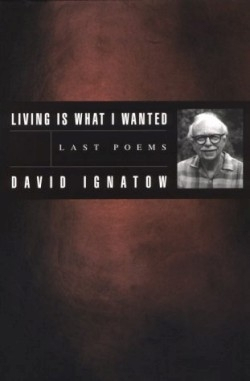Living is What I Wanted
Last Poems
This book, Ignatow’s last before his death, is inundated with honesty and the quiet irony of a fine poet looking his death straight in the eye and saying, I wish it weren’t this way, but since it is, this is what I have to say. He does say it. Unlike much of his earlier, intense work with the prose poem, most of these poems are small pools of short-lined, direct questioning of the quandary death puts people in.
As he looks at death, he seems to be asking how to live and these are poems that answer the heart of the matter. Yet, because he is always aware of the nature of language, he is never far from paradox or the unexpected turns, which have always marked his poetic voice. The result, though focused on the “I,” is not self-indulgent, but questions the nature of living. “Does being born matter/now that I am leaving it behind? Where/is a world I can go to/ other than this ground/ on which I walk and where I built my house/…”
He is sometimes impersonal, exploring the question of living with dry, effaced wit, “All living is lying/ we are unable to say what life is./ We speak about it in metaphors/ as if it could be other/ than what it is, and even to ourselves/ we say we are like this or that.”
He also is, however, personal in these poems, to the point where many of the poems are about friends or family—Rosa, Vivi, Cousin Alex, his daughter and father come into his memory to be considered and finally accepted, if not understood. It is this interest in and compassion toward the humanity around him that seems to be most consistent with the poetry of his past. He has never lost touch with being human, with its monstrous imperfections and doubtful reasoning.
In this collections? finest poem, and one of the only long poems, “My Skeleton, My Rival,” he asks his friends to forgive him for what he will become, this other thing, and to remember the work of his entire being, the poetry. This is a book full of resonance since it deals with a universal issue, but it will have special appeal for older readers who want to grapple head-on with what it means to have lived.
Disclosure: This article is not an endorsement, but a review. The publisher of this book provided free copies of the book to have their book reviewed by a professional reviewer. No fee was paid by the publisher for this review. Foreword Reviews only recommends books that we love. Foreword Magazine, Inc. is disclosing this in accordance with the Federal Trade Commission’s 16 CFR, Part 255.

